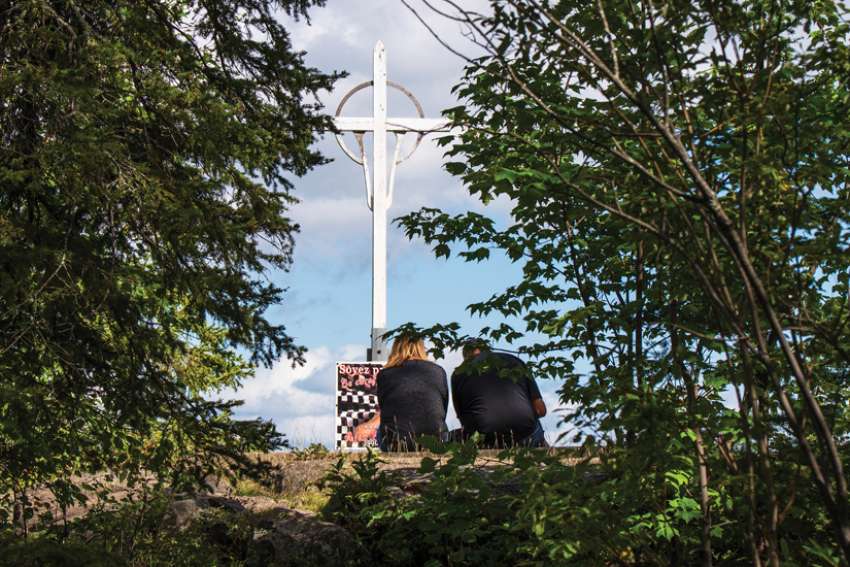Fr. Stephan Kappler, president and chief psychologist at Southdown Institute, likens the pandemic experience to a collective trauma with repeated aftershocks. Going “back to normal” to many has seemed an elusive goal as vaccination campaigns work to outpace the rise of variants. Under the circumstances, Kappler says making intentional time to reconnect with the spiritual self is crucial in achieving a sense of meaning and life direction.
“(COVID-19) has not been a one-time trauma, it’s been continuous,” said Kappler. “We are all trying to somehow navigate our way through it. I think it’s more necessary than ever for people to be aware of how much this has affected us and to seek whatever is helpful to remedy and to bring some balance and resilience back to the forefront. I think retreat takes a whole different importance now.”
Things are looking a lot more normal at Southdown — which services clergy and lay people in Holland Landing, Ont., north of Toronto — as U.S and international borders have opened up to service clients from around the globe. Kappler says that whereas in the past taking a retreat may have been seen as a luxury item, this year the services have been essential along with connecting with a psychotherapist. With many running on low, a week of seeking the intentional solace and support from the Lord and spending intentional time engaged in gratitude is of vital importance.
“It would be really hard to find someone who doesn’t feel their spiritual reservoirs are empty,” said Kappler. “I think the retreat is a wonderful opportunity to help refill that spiritual reservoir because we’re in this for the long haul.
“If we get in a car and the tank is just about empty, you know you’re not going to get very far. I think the same is true for our spiritual lives in retreat time. Time in prayer and in intentional community are all ways to refill that tank.”
Though in-person Masses have resumed, many continue to opt for virtual services due to capacity restrictions and continued fears around the virus. With so much of the faith revolving around fellowship, prayer and worship in communities, staff at retreat centres say people have felt isolated from that sense of healing that comes from being part of a loving community.
The impact of residential schools, particularly in light of the ongoing discovery of unmarked graveyards outside of the former institutions around the country, has also caused feelings of loneliness and separation, says Kappler. Many Catholics feeling the pain of the traumatic history are not those directly connected to it, but the pain is being felt strongly.
“We can’t pretend that we are not in the midst of this additional stress and that’s the pain from the residential schools,” said Kappler. “Many people are grappling with their faith, the expression of their faith and grappling with their Catholicism. All of these things taken together I think really show we have a lot of healing to do. People are hurt, lonely and isolated and many people really don’t know what to do with all those emotions that are conflicting. That’s why it makes sense you want to create safe and healing spaces that bring about that healing.”
Though it might seem the last thing someone would want is more isolation at a retreat centre after more than a year of COVID-19, Becky Kallal, executive director at Edmonton’s Providence Renewal Centre, says the high demand for services shows people still craving the unique retreat experience.
“Even if you have been in isolation from COVID, that’s not the same kind of isolation as coming away to a prayerful or spiritual, soul-reviving type of environment,” said Kallal. “I think it’s a different experience than being in isolation in your home. I think people still crave that and perhaps crave it even more. We’re ready to get back out into the world and you need to feed your soul not just your body. There’s that yearning to get all of you ready to be revived again.”
The pandemic has forced retreat centres to adjust their services. Providence Spirituality Centre in Kingston, Ont., has not been able to open its doors in the usual manner but like other centres has continued services in the virtual realm. Throughout the pandemic Sr. Lucy Bethel, director of the centre, has seen an increased openness from people more willing to access the services online. Although it hasn’t been an answer for everyone, Bethel says online services have been a saving grace.
One of the biggest changes at Southdown has been the expansion of services, with more outpatient psychotherapy offered to the lay Catholic community. The duration of the pandemic has also brought out a lot of maladaptive coping such as drinking and overeating and retreat offers an opportunity for redirection in finding healthy patterns again.


